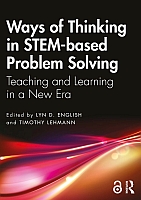Ways of Thinking in STEM-based Problem Solving
Proposal review
Teaching and Learning in a New Era

Contributor(s)
English, Lyn D. (editor)
Lehmann, Timothy (editor)
Collection
UK Research and InnovationLanguage
EnglishAbstract
Taking a future-oriented approach, this book addresses students’ ways of thinking in STEM-based problem solving. It provides a rich set of chapters that explore how we can advance important thinking skills in STEM education for K-12 students. STEM education is essential to understanding and solving many of the world’s major challenges. However, the kind of interdisciplinary modes of thinking required to tackle such unforeseen problems is lacking in most STEM education delivery. This book examines the various ways of thinking that can be applied to effective STEM-based problem solving across K-12 education. These include design and design-based thinking, systems thinking and modeling, critical thinking, innovative and adaptive thinking, intuition in problem solving, and computational and algorithmic thinking. Across the chapters, the authors’ interdisciplinary perspectives give further depth to understanding how students learn and apply their thinking to solve STEM-based problems. The book also provides guidance on how to assess ways of thinking in STEM education, to ensure educators can recognize students’ progress and development. Bringing together a team of international experts, this book is essential reading for pre-service teachers, teacher educators, and researchers in STEM education.
Keywords
Education / General; Education / Decision-Making & Problem Solving; Education / Elementary; Education / Secondary; Education / Teaching Methods & Materials / Mathematics; Education / Teaching Methods & Materials / Science & TechnologyDOI
10.4324/9781003404989ISBN
9781003404989, 9781032520346, 9781032520339Publisher
Taylor & FrancisPublisher website
https://taylorandfrancis.com/Publication date and place
London, 2024Grantor
Imprint
RoutledgeClassification
Education
Primary and middle schools
Secondary schools
Teaching of a specific subject
